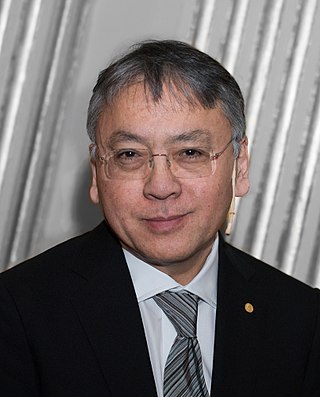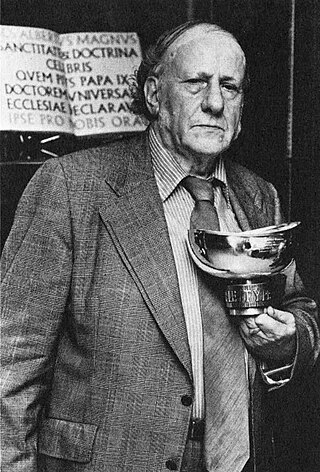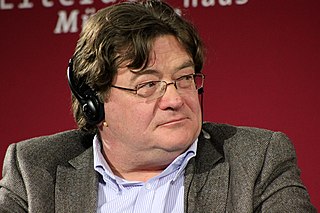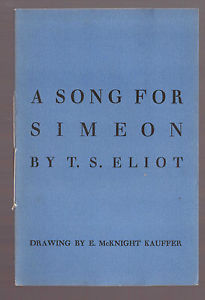
Thomas Stearns Eliot was a poet, essayist and playwright. He was a leading figure in English-language Modernist poetry where he reinvigorated the art through his use of language, writing style, and verse structure. He is also noted for his critical essays, which often re-evaluated long-held cultural beliefs.

Maria Wisława Anna Szymborska was a Polish poet, essayist, translator, and recipient of the 1996 Nobel Prize in Literature. Born in Prowent, she resided in Kraków until the end of her life. In Poland, Szymborska's books have reached sales rivaling prominent prose authors', though she wrote in a poem, "Some Like Poetry", that "perhaps" two in a thousand people like poetry.

Sir Kazuo Ishiguro is a Japanese-born British novelist, screenwriter, musician, and short-story writer. He is one of the most critically acclaimed contemporary fiction authors writing in English, having been awarded the 2017 Nobel Prize in Literature. In its citation, the Swedish Academy described Ishiguro as a writer "who, in novels of great emotional force, has uncovered the abyss beneath our illusory sense of connection with the world".

The Remains of the Day is a 1989 novel by the Nobel Prize-winning British author Kazuo Ishiguro. The protagonist, Stevens, is a butler with a long record of service at Darlington Hall, a fictitious stately home near Oxford, England. In 1956, he takes a road trip to visit a former colleague, and reminisces about events at Darlington Hall in the 1920s and 1930s.

Paul Muldoon is an Irish poet.

Farrar, Straus and Giroux (FSG) is an American book publishing company, founded in 1946 by Roger Williams Straus Jr. and John C. Farrar. FSG is known for publishing literary books, and its authors have won numerous awards, including Pulitzer Prizes, National Book Awards, and Nobel Prizes. As of 2016, the publisher was a division of Macmillan, whose parent company is the German publishing conglomerate Holtzbrinck Publishing Group.

"Journey of the Magi" is a 43-line poem written in 1927 by T. S. Eliot (1888–1965). It is one of five poems that Eliot contributed for a series of 38 pamphlets by several authors collectively titled the Ariel Poems and released by the British publishing house Faber and Gwyer. Published in August 1927, "Journey of the Magi" was the eighth in the series and was accompanied by illustrations drawn by American-born avant garde artist Edward McKnight Kauffer (1890–1954). The poems, including "Journey of the Magi", were later published in both editions of Eliot's collected poems in 1936 and 1963.
Timothy Peter Mo is a British Asian novelist. Born to a British mother and a Hong Kong father, Mo lived in Hong Kong until the age of 10, when he moved to Britain. Educated at Mill Hill School and St John's College, Oxford, Mo worked as a journalist before becoming a novelist.

Berthold Ludwig Wolpe was a German calligrapher, typographer, type designer, book designer and illustrator. He was born into a Jewish family at Offenbach near Frankfurt, emigrated to England soon after the Nazis came to power in 1935 and became a naturalized British citizen in 1947. He was made a Royal Designer for Industry in 1959, awarded an honorary doctorate by the Royal College of Art in 1968 and appointed an Officer of the Order of the British Empire (OBE) in 1983. He died in London in 1989.
Nicholas Laird is a Northern Irish novelist and poet.
Hugo Williams is an English poet, journalist and travel writer. He received the T. S. Eliot Prize in 1999 and Queen's Gold Medal for Poetry in 2004.

John Burnside FRSL FRSE was a Scottish writer. He was one of four poets to have won the T. S. Eliot Prize and the Forward Poetry Prize for one book. In Burnside's case it was for his 2011 collection, Black Cat Bone. In 2023, he won the David Cohen Prize.
Paul Farley FRSL is a British poet, writer and broadcaster.
T. S. Eliot's Ariel poems are those written for Faber and Faber's series of Ariel Poems. All but "Triumphal March" also appear in his book Collected Poems: 1909–1962 under the heading Ariel Poems.

The T. S. Eliot bibliography contains a list of works by T. S. Eliot.
Nosy Crow is an independent children's publisher, based in London. The company was founded in 2010 by Kate Wilson, formerly MD of Macmillan Children’s Books and Group MD of Scholastic UK Ltd, Adrian Soar, formerly Book Publishing CEO of Macmillan Publishers, and Camilla Reid, formerly Editorial Director of Campbell Books. In 2020, the company was named Independent Publisher of the Year at the British Book Awards. As of 2021, Nosy Crow is the UK's 11th largest children's publisher, according to Nielsen BookScan data.

"A Song for Simeon" is a 37-line poem written in 1928 by the American-English poet T. S. Eliot (1888–1965). It is one of five poems that Eliot contributed to the Ariel Poems series of 38 pamphlets by several authors published by Faber and Gwyer. "A Song for Simeon" was the sixteenth in the series and included an illustration by avant garde artist Edward McKnight Kauffer. The poems, including "A Song for Simeon", were later published in both the 1936 and 1963 editions of Eliot's collected poems.
The Found in Translation Award is an annual award for the best translation of Polish literature into English. The award is given to the translator(s) who also receive a cash prize of PLN 16,000.

Clare Cavanagh is an American literary critic, a Slavist, and a translator. She is the Frances Hooper Professor in the Arts and Humanities and Chair of the Department of Slavic Languages and Literatures at Northwestern University. An acclaimed translator of contemporary Polish poetry, she is currently under contract to write the authorized biography of Czesław Miłosz. She holds a B.A from the University of California, Santa Cruz, and an M.A. and PhD from Harvard University. Before coming to Northwestern University, she taught at the University of Wisconsin, Madison. Her work has been translated into Russian, Polish, Hungarian, French, Dutch, Chinese, and Japanese.

The 2017 Nobel Prize in Literature was awarded to the British novelist Kazuo Ishiguro "who, in novels of great emotional force, has uncovered the abyss beneath our illusory sense of connection with the world." The prize was announced by the Swedish Academy on 5 October 2017.












